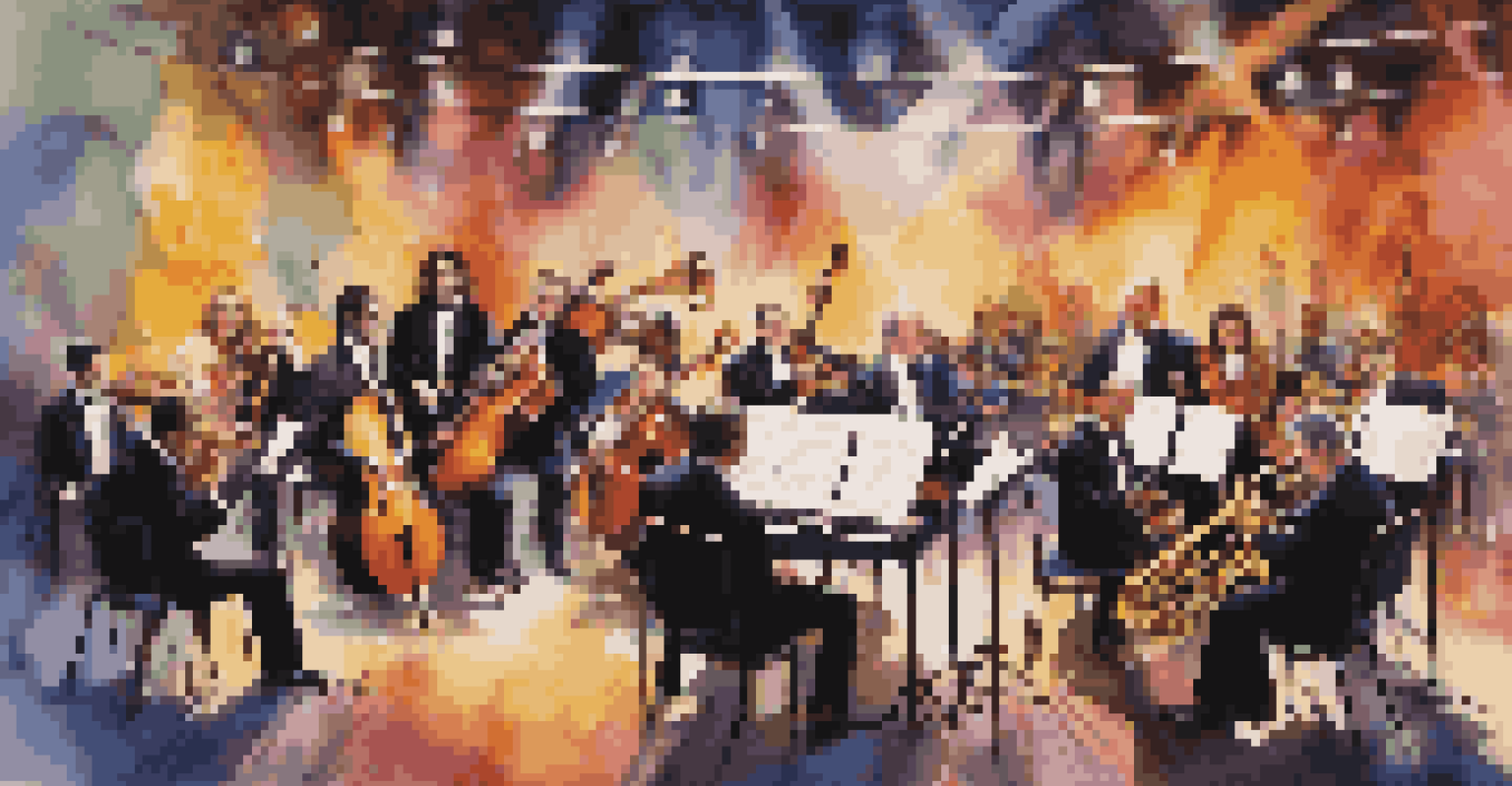The Influence of Globalization on Classical Music Traditions

Defining Globalization and Classical Music
Globalization is the process that connects people, cultures, and economies worldwide. In essence, it allows for the flow of ideas, music, and traditions across borders. Classical music, with its rich history and diverse styles, has been both influenced and transformed by this global interconnectedness.
Music is the universal language of mankind.
As cultures blend and interact, classical music traditions face new challenges and opportunities. The influx of global influences can breathe fresh life into traditional forms, leading to innovative compositions and performances. However, it can also lead to the dilution of some classical traditions, raising questions about authenticity.
Understanding the intersection of globalization and classical music is crucial for musicians, scholars, and enthusiasts alike. It challenges us to appreciate the evolution of music while honoring its roots. This dynamic relationship sets the stage for a fascinating exploration of how classical music adapts and thrives in a global context.
Cultural Exchange: A Two-Way Street
Globalization fosters a vibrant cultural exchange, where classical music from one region can influence another. This exchange often leads to hybrids, where traditional elements are fused with contemporary styles. For example, the incorporation of jazz elements into classical compositions has led to exciting new genres.

When musicians collaborate across borders, they bring their unique perspectives and techniques, enriching the classical music landscape. A pianist from Japan collaborating with a violinist from Italy can create a performance that blends cultural nuances and musical traditions. These cross-cultural projects can captivate audiences and expand their musical horizons.
Globalization Enhances Classical Music
Globalization fosters cultural exchange, allowing classical music to evolve by integrating diverse influences and styles.
Cultural exchange also offers opportunities for education and learning. Aspiring musicians can study different techniques and styles from around the world, broadening their skills and understanding. This not only nurtures individual artists but also fosters a global appreciation for classical music.
Preservation of Classical Music Traditions
While globalization introduces new influences, it also raises concerns about the preservation of classical music traditions. Many communities strive to maintain their local music styles amid the influx of global sounds. Festivals and workshops dedicated to traditional music play a vital role in keeping these practices alive.
The world is but a canvas to our imagination.
Organizations and initiatives worldwide focus on documenting and archiving classical music traditions. By recording performances and sharing educational resources, they help safeguard these rich heritages for future generations. This effort is crucial, as it ensures that the essence of classical music remains intact.
Preservation efforts often involve collaboration between local musicians and global experts. This synergy can lead to a revival of interest in classical traditions, as new audiences discover the beauty of heritage music. In this way, globalization can serve as a double-edged sword: both a threat to and a catalyst for preservation.
Technological Advances and Classical Music
Technology plays a pivotal role in the globalization of classical music. With the rise of the internet and streaming platforms, musicians can now reach audiences worldwide. This accessibility allows classical music to find a place in diverse cultural contexts, furthering its global influence.
Online music lessons and virtual collaborations have also made it easier for aspiring musicians to learn from masters across the globe. A student in a small town can now take lessons from a renowned teacher based in a major city, breaking down geographical barriers. This democratization of access enriches the global classical music community.
Preserving Traditions Amid Change
While globalization introduces new elements, efforts to preserve classical music traditions are crucial for maintaining cultural heritage.
Moreover, technology enables innovative performances that blend classical music with modern genres. Artists can experiment with multimedia presentations, creating immersive experiences for audiences. This fusion of technology and tradition invites new listeners, expanding the reach of classical music.
Globalization and the Evolution of Classical Music Styles
As globalization continues to shape the world, classical music is evolving in response. Traditional forms are being reinterpreted through modern lenses, creating exciting new styles. For example, composers are now integrating elements from various cultures, leading to unique and innovative compositions.
This evolution allows classical music to remain relevant in contemporary society. By incorporating diverse influences, it speaks to a broader audience who may not initially connect with traditional forms. This adaptability is key to the survival of classical music in an ever-changing world.
As we witness this transformation, it’s essential to embrace both the old and the new. The evolution of classical music styles showcases its resilience and ability to thrive despite external pressures. This dynamic interplay between tradition and innovation enriches the musical landscape.
Audience Reception and Global Classical Music
The globalization of classical music has led to a diverse audience that appreciates a wide array of styles. Listeners are now exposed to music from different cultures, broadening their tastes and expectations. This evolving audience plays a significant role in shaping the future of classical music.
Moreover, globalization has democratized access to classical music events. With international festivals and online concerts, audiences can experience performances that were once out of reach. This newfound accessibility has sparked interest in classical music across various demographics.
Technology's Role in Accessibility
Advancements in technology have democratized access to classical music, enabling global collaboration and expanding audience reach.
As audiences embrace global styles, musicians are encouraged to experiment and innovate. The response to these new creations can lead to exciting collaborations and fresh interpretations of classical works. The relationship between audience and artist is more dynamic than ever, reflecting the influence of globalization.
Challenges Faced by Classical Music Traditions
Despite the benefits of globalization, classical music traditions face significant challenges. The commercialization of music can sometimes overshadow authentic expressions of culture. As popular music dominates the scene, traditional forms may struggle to find their place in the spotlight.
Additionally, younger generations may gravitate towards contemporary genres, leaving classical music at risk of becoming an afterthought. This generational gap highlights the need for innovative approaches to engage new audiences. Educators and musicians must work together to bridge this divide and spark interest in classical traditions.

Addressing these challenges requires a collective effort from artists, educators, and audiences. By fostering appreciation for classical music and its traditions, we can ensure its survival in a globalized world. The future of classical music lies in our ability to adapt while honoring our rich heritage.
The Future of Classical Music in a Globalized World
Looking ahead, the future of classical music is filled with possibilities. As globalization continues to influence musical landscapes, we can expect further innovation and collaboration. The blending of styles and traditions will likely yield new genres that reflect the diverse world we live in.
Moreover, the ongoing dialogue between tradition and modernity will shape the evolution of classical music. Musicians who embrace this dynamic will not only preserve their heritage but also create exciting new paths for future generations. This adaptability is crucial for the continued relevance of classical music.
Ultimately, the future of classical music is a shared journey. By celebrating its rich traditions while welcoming global influences, we can cultivate a vibrant musical community. Together, we can ensure that classical music remains a cherished part of our cultural heritage.